features
International Women’s Day: The female street-food pioneers leading the charge
17 Mar 2022
9m
We don’t need to tell you that some of the biggest and most disruptive street food brands have been owned by women.
You may have gorged on some of their food on a raging hangover at a festival, grabbed a bite on your lunch break, or seen their cooking blowing up your Instagram.
So, for International Women’s Day, Twisted chatted to five of the most incredible female street food pioneers about their journeys to the top, and the realities of navigating the industry as a woman.
Club Mexicana
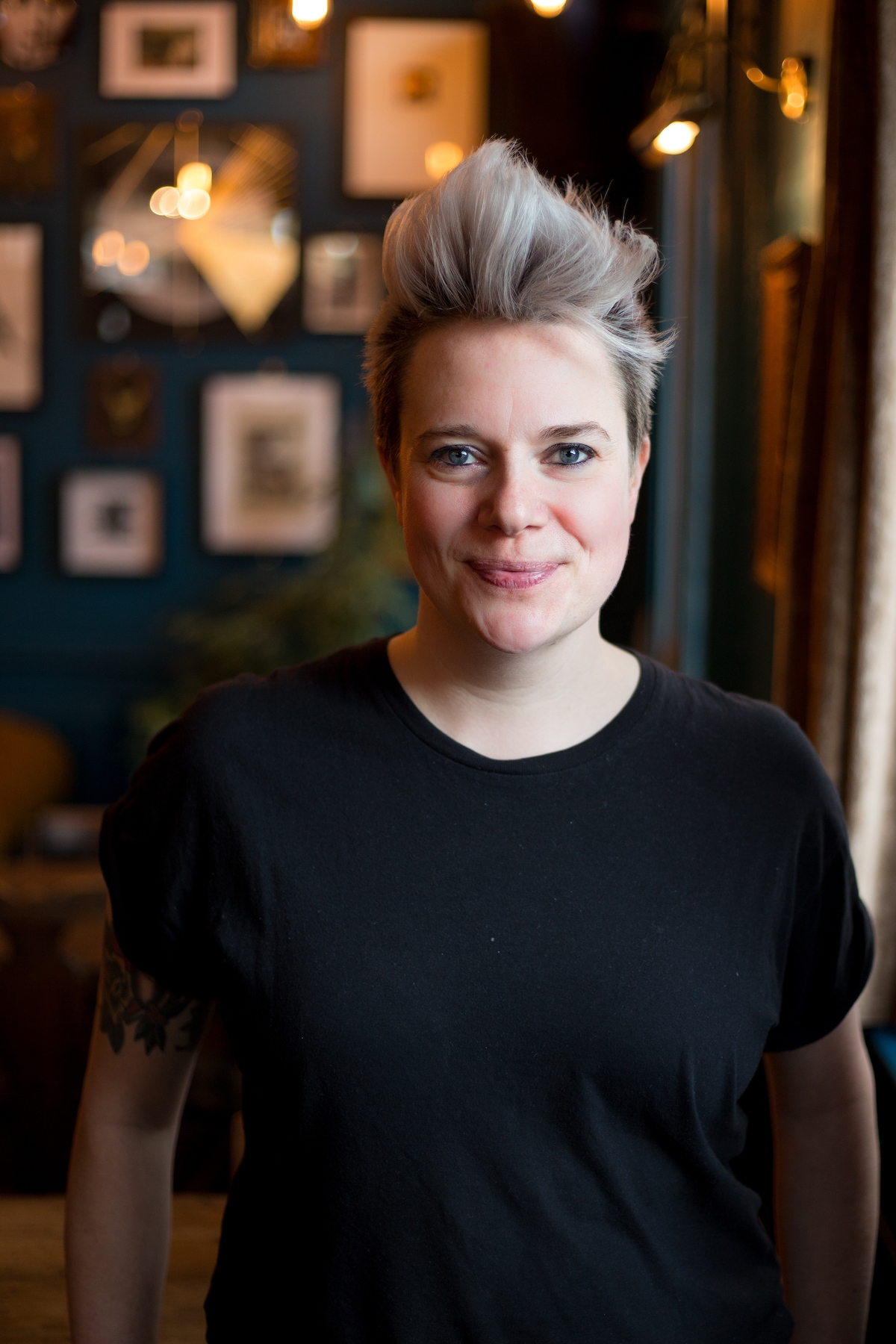
Meriel is founder of Club Mexicana (Credit: Jade Sarkhel)
When Meriel Armitage set up Club Mexicana in 2014, at Street Feast’s market in Dalston Yard, she was determined to give veganism a “rebrand”.
“It was the time when street food was kicking off and I went to some of the markets and there was only a veggie burger without any mayo… and I was just like, this is bullshit,” she says.
After quitting her advertising job, spending a couple of years working in her local vegan cafe and running supper clubs, her plant-based Mexican concept, Club Mexicana, was born, and almost instantly became a success with vegans and non-vegans alike.
It’s not hard to see why. Her food doesn’t shout about being vegan, it’s just bold, colourful, and undeniably delicious, and the likes of her cheezeburger and baja ‘tofish’ tacos have taken her on a journey from market stalls to a Soho bricks and mortar site, today.
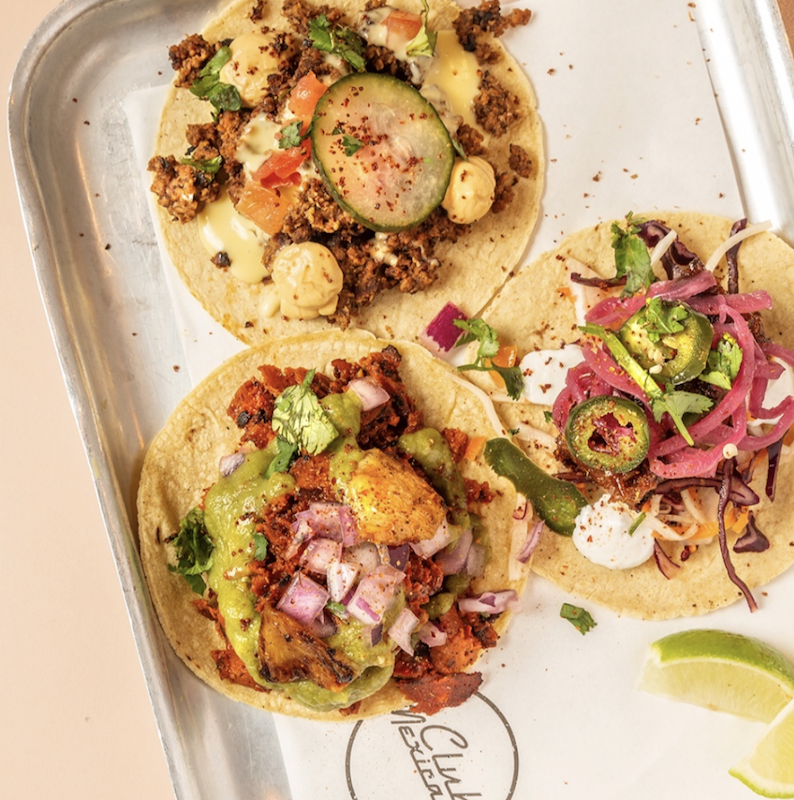
The Al Pastor, The Cheezeburger + The BBQ Short “Rib.” (Credit: Club Mexicana)
Looking back on the start of her journey, Meriel says one thing was hard to ignore – she was one of the few women amongst a sea of men.
“A lot of women who set up street food businesses have a different mindset,” she reasons. “Some of the lowest points of my career have been after having a really crappy trading day, coming home freezing and putting food in the bin.
“Lots of [women] are really fastidious about working out their numbers and find out sooner than a lot of blokes that they’re not making money.”
Meriel has pushed through every moment of doubt, and strived ever since to encourage more women into the space, hiring a majority female team and listening to their needs every step of the way.
But she says, despite positive change, she’s all too aware she’s still in “a minority” today.
“There needs to be a fundamental shift in what working in the food industry is,” she says. “Part of that change is women running businesses, like me, and making sure that they’re doing the best that they can to attract loads of diverse talent, listening to them and seeing what they can do to make things work.”
She adds: “With what we’ve just gone through with the pandemic, there are a lot of people who have quit the food world.
“Now, all we can hope is that they’re going to be replaced by a new wave of young, talented, pioneering young women.”
Maize Blaze
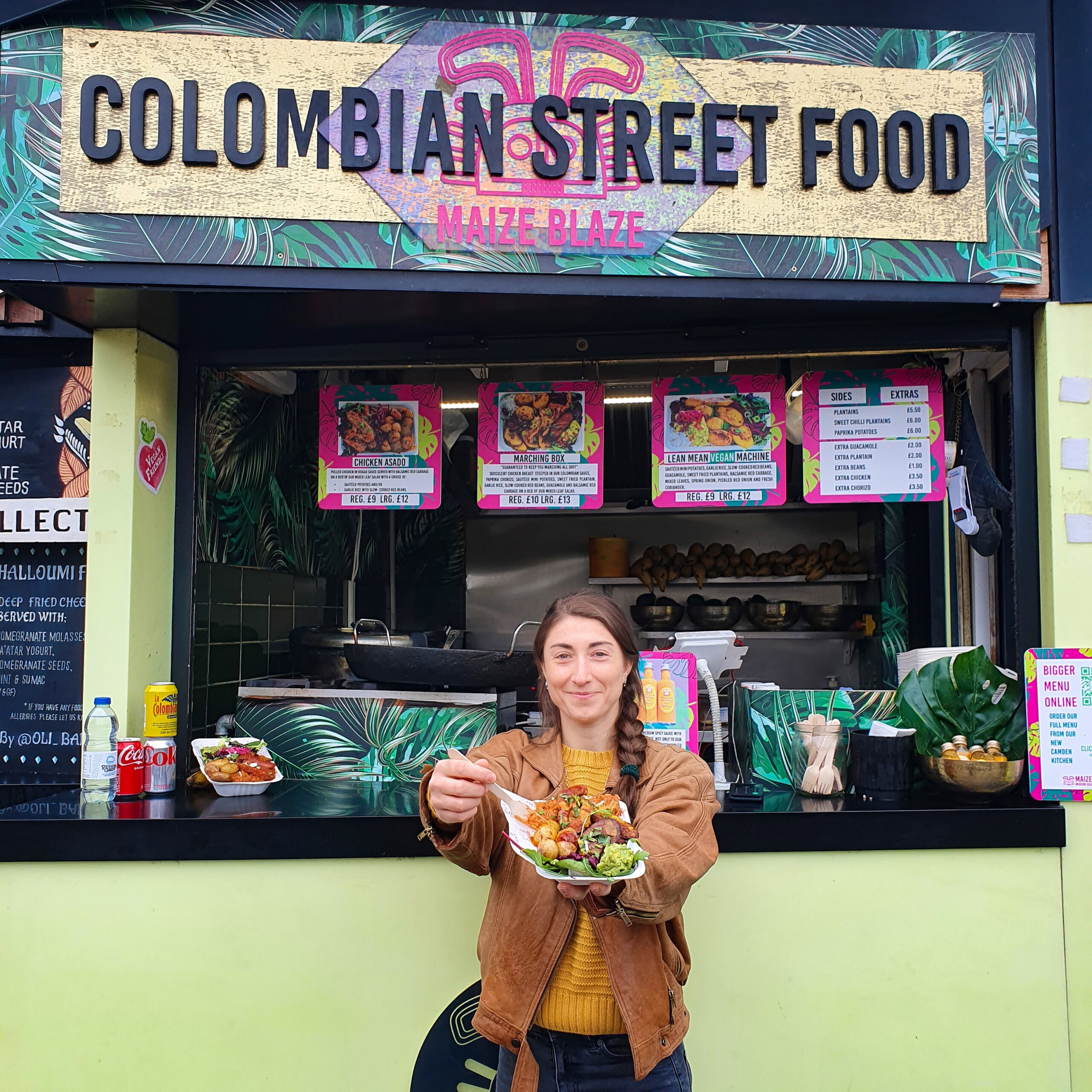
Maize Blaze was founded by Ruth (Credit: Ruth Christianson-Monroy)
“There’s not many of us women around,” laughs Maize Blaze founder Ruth Christianson-Monroy, echoing Meriel’s sentiments – but she’s never let that phase her.
Ruth started her street food stall in 2014, after realising there weren’t many places offering food from Colombia.
“My mom was Colombian and we came here when I was eight, and each year I’d go back with my family and eat all the amazing foods, like stuffed empanadas.
“Then I’d come back here and there were a couple of places where you could get them, but I didn’t really feel like Colombia was well represented, which I just thought was a massive shame,” she says.
Determined to make her mark on the food scene, Ruth ditched her job in the city, took a few months to regroup and then jumped into London’s Camden market on a wing and a prayer, selling empanadas, and later expanding to include arepas to meat and veg boxes, stuffed with tropical Colombian flavours, across her original site and a spot in Hackney Wick.
Ruth is understandably proud of her achievements today, but she says there were many who doubted she could manage the daily grind unassisted.
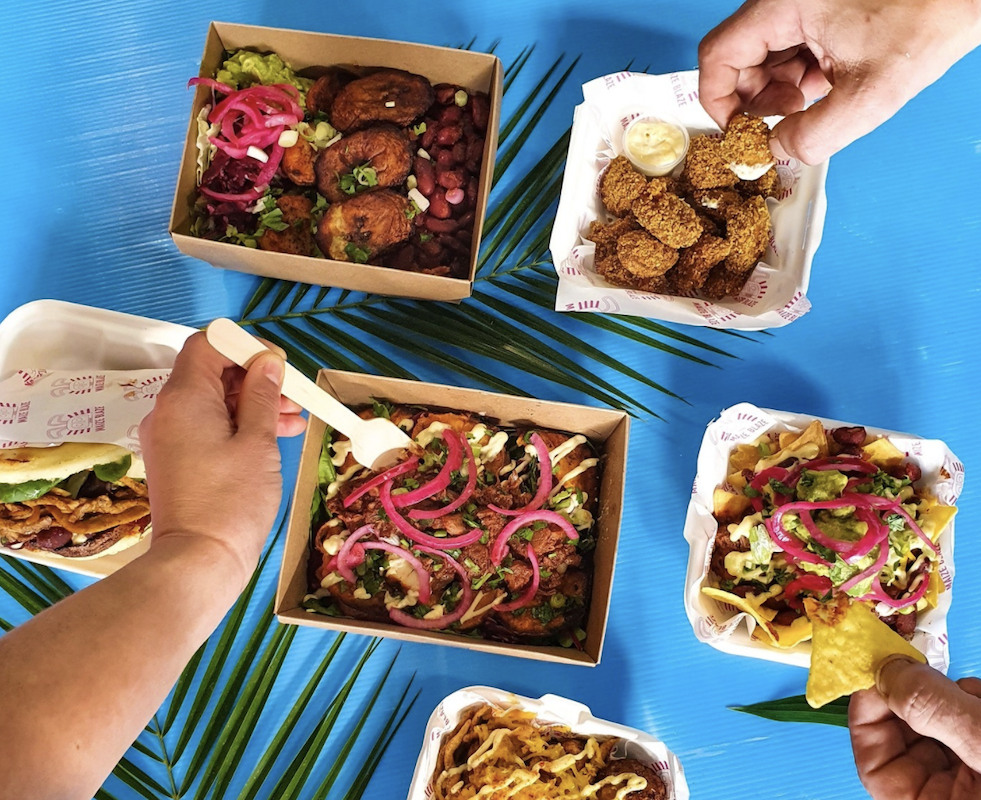
Maize Blaze’s menu modernises Colombian fare (Credit: Maize Blaze)
“It tends to be a bit of a boys club,” she says. “Oh my gosh, I was often told to my face that I needed a man to help me and I’d be like ‘no, I can do this, I’m fine.’
“There was often heavy equipment, but I was so against the idea that I shouldn’t do it because I was a woman… so I just got stronger”.
Her interest in food peaked at Le Cordon Bleu, where she instantly noticed that whilst there were a lot of women, she was one of the only ones looking to pursue food as a career.
And even today, she says she’d love to encourage women who love food, and have bright ideas, to take the plunge.
“When I was younger, I wasn’t really as sure of myself as I am now,” she says. “Today, I’m so much more confident, and that comes from being my own boss.
“I don’t see the world in the same way at all.”
Anna Mae’s Mac ‘N’ Cheese
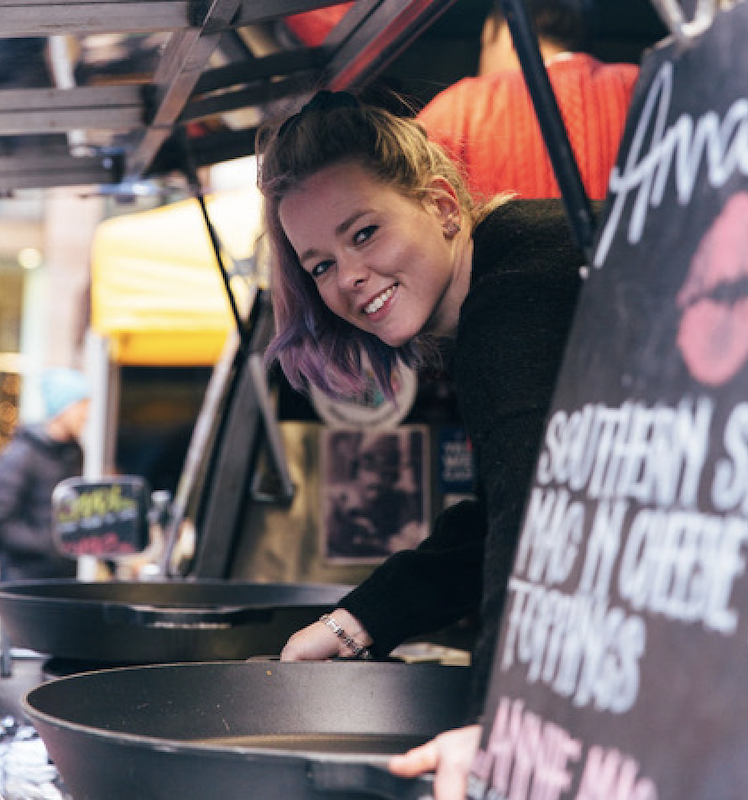
Anna Mae’s Mac ‘N’ Cheese is now a street food OG (Credit: Anna Maes Mac ‘N’ Cheese)
Anna Mae is undoubtedly one of the OGs of the street food world. Today, you’ll struggle to find a market without American food, but she was one of the veterans that made it mainstream.
The idea for her stall came after she and her partner Tony fell in love with US BBQ food and the “cultural mish-mash” of flavours whilst travelling. They set up shop in 2010, and it soon became clear it was mac ‘n cheese which captivated people’s attention the most.
“People still didn’t really know what it was,” she says. “They would ask ‘are these Big Macs?’ and we were like, ‘no, it’s what you would understand to be macaroni and cheese’.
“And it was kind of like we’re reinventing that, you know, a lot of people would think about school dinner macaroni cheese…. it’s boring, it’s dry, it’s got horrible dried out tomatoes baked on top of it, and it’s sliced.
“We had to be like, no, it’s not how you remember, you can watch the process…cheese tumbling in and melting through.
“We’d get people standing even in slashing rain just to try it.”
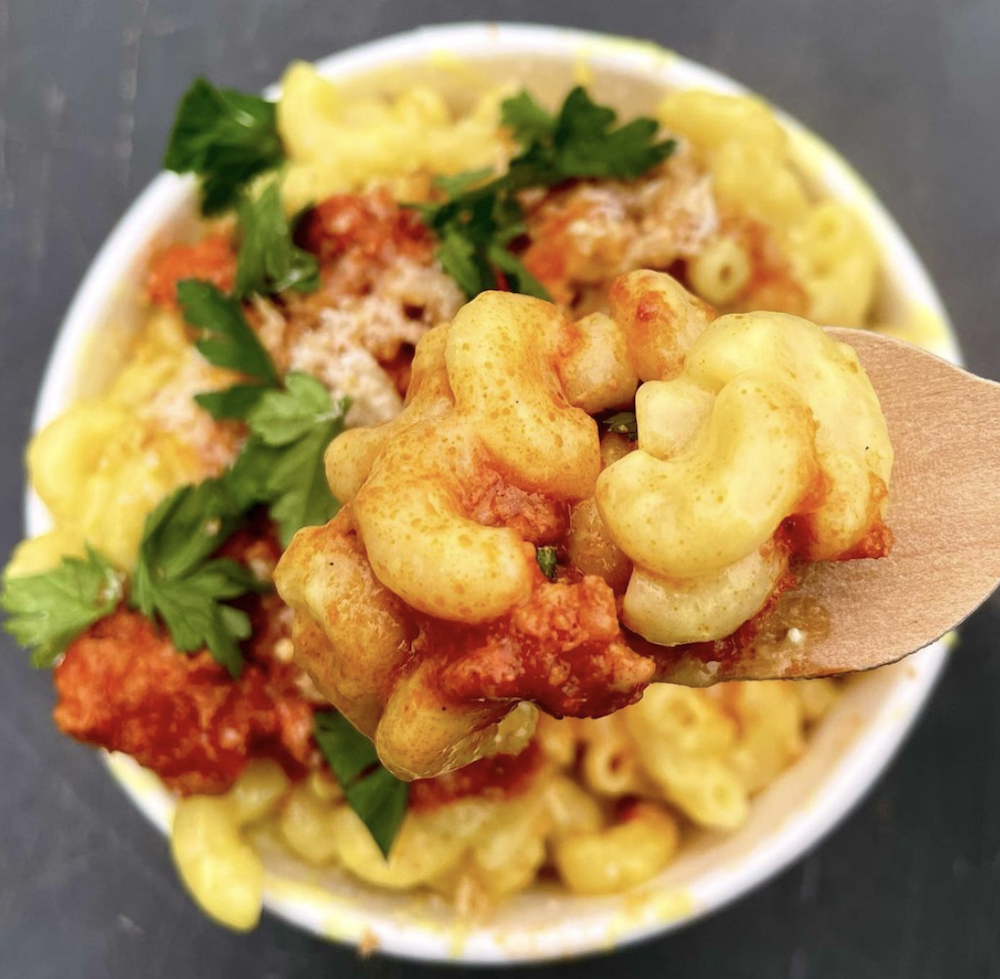
Mac ‘N’ Cheese with spicy sausage ragu, pig skin and smoked garlic fried breadcrumbs (Credit: Anna Mae’s Mac ‘N’ Cheese)
A festival stronghold and a regular and many of the city’s markets, Anna and Tony’s venture has been phenomenally successful, and the pair even have their own cookbook today.
Whilst she acknowledges the food industry as a whole is “very male dominated”, Anna says the street food space offers a real opportunity to women.
“In street food, there’s a chance for real creativity,” she says. “So it was less about if you are a man or a woman and more about the vibe and making the right food to appeal to your audience.
“I think street food particularly gives women with a passion for food a real opportunity to go out there and try things on their own – not trying to integrate into a big kitchen full of men, which can be quite intimidating, even though, of course, it shouldn’t be.
“My truck is my kitchen, and I will run that kitchen in the way I want. I can create the kind of atmosphere that I find useful for me and other women to work in.
“So yeah, while the food industry is changing, which is great, I think street food offers women something quite unique”.
READ MORE: Burger King defended by women’s charity after controversial IWD post
Hanoi Chay
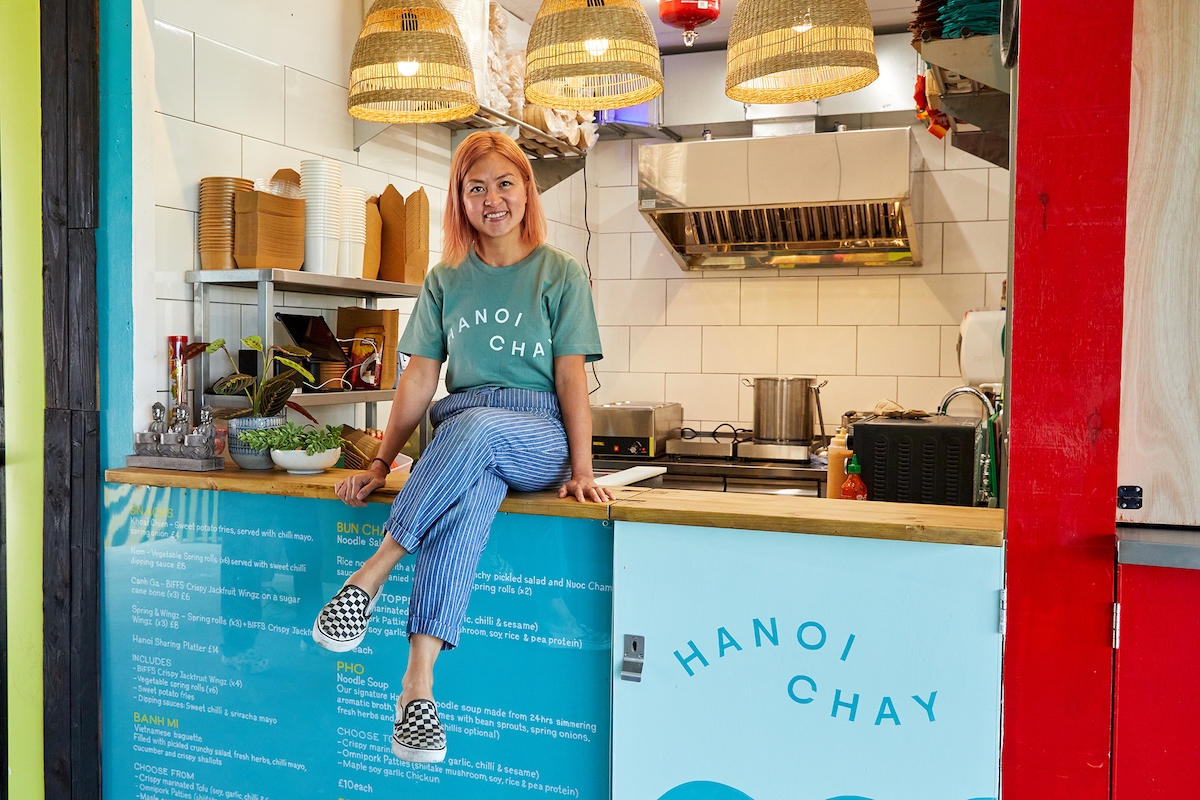
Gina runs Hackney’s Hanoi Chay (Credit: Hanoi Chay)
Hanoi Chay founder, Gina Lely has fond memories of the Vietnamese food her mother and grandmother fed her growing up: light, aromatic pho, simmered for at least 24 hours, and bánh mì, which are baguettes filled with marinated meat, salad and veg.
A post Vietnam war immigrant, she came to England with them on a boat when she was just a baby, and after a “horrendous” journey, the family were rehoused in the UK.
“I think my mom and my grandma are amazing, inspirational, strong women to have taken that journey, and they’ve absolutely got me to where I am today,” she says.
It’s clear their influence not only as incredible cooks, but powerful, female role models, has stayed with her ever since.
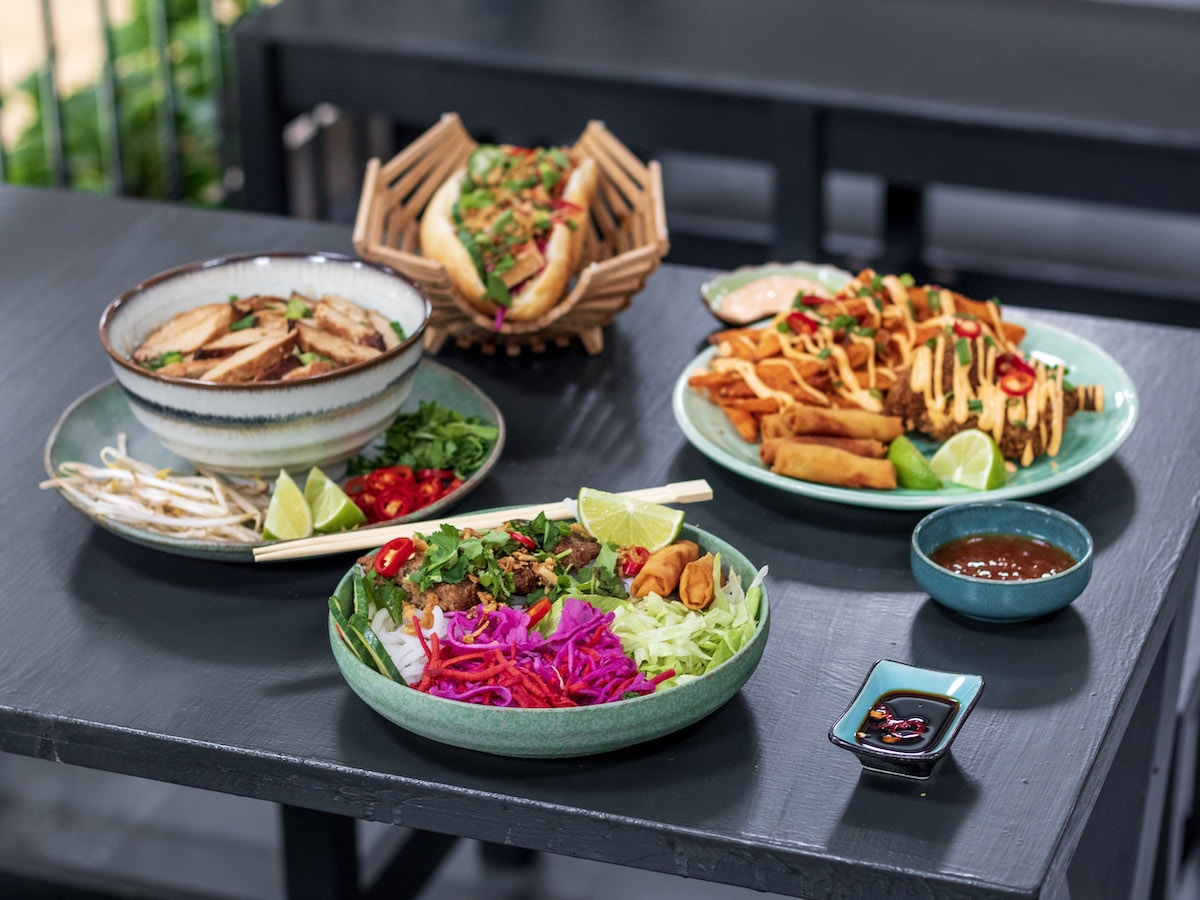
Hanoi Chay’s food is all inspired by Gina’s grandmother’s cooking (Credit: Hanoi Chay)
Gina broke onto the food scene in 2015, running a Vietnamese market stall alongside her 9-5 office job and being a full-time mother.
“Not only is it physically really gruelling, but also, when I started, there wasn’t many women, so you would get odd looks from other market traders and sometimes condescending comments,” she says.
“You wouldn’t be taken seriously. It’s almost like ‘okay, you’re here but who’s going to help you? Where’s your business partner?’
“I initially found it quite offensive, but then afterwards, I found it funny, because I was actually doing really well”.
There’s no denying the sneers were sorely misguided. As excitement grew around her fresh, vibrant flavours, she quit her job and opened her first permanent stall, Hanoi Cà Phê, in Walthamstow, and it was all up from there.
Shortly afterwards came a prep kitchen in Leyton, and her newest street food venture, Hanoi Chay, launched last year, a vegan haunt in Hackney Bridge, in tribute to her grandmother Quyen, who was a practising Buddhist.

Gina’s mother and grandmother – who inspired Hanoi Chay (Credit: Hanoi Chay)
“My mom and my grandma’s story – actually fighting for their life to come to a country – taught me that if you have that fighting spirit and that belief in yourself, man or woman, you can achieve,” she says.
“I have two boys. And I’m always thinking, ‘my boys need to respect women and what we go through’.
“I’m the only female in my own household, so I feel like I need to champion mum, and show what I’m capable of”.
Happy Endings
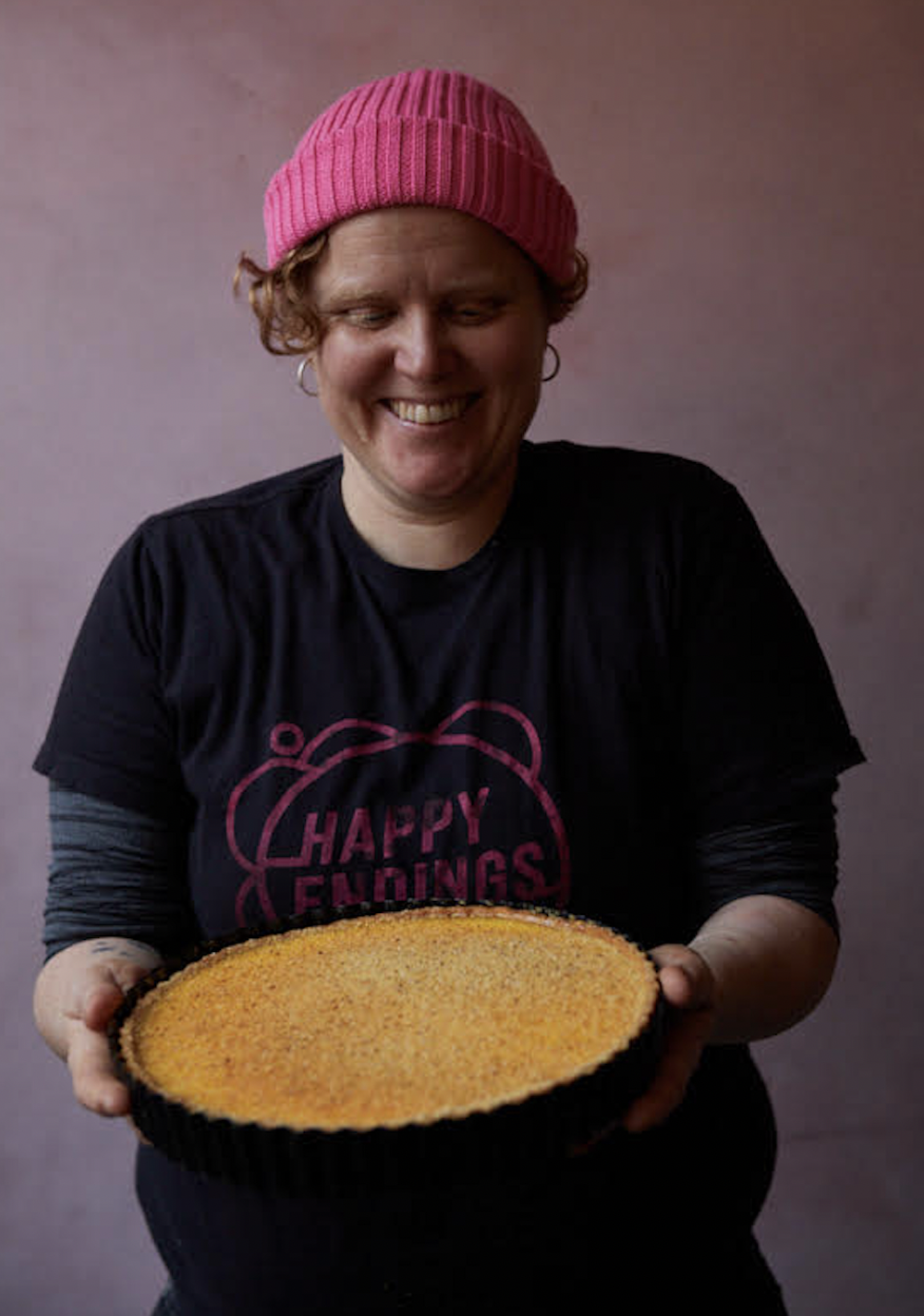
Terri Mercieca is the brains behind Happy Endings (Credit: Happy Endings)
Happy Endings happened by happy accident. Terri Mercieca had been supporting a friend at a market in Dalston, London, selling ice cream sandwiches (or not, as the case may be).
Arriving home with 500 ice creams in her freezer after a pretty shoddy trading day, she realised she had to somehow shift them – and after a handy introduction to the team at Japanese chain, Tonkotsu, in 2014, the dessert sandwiches started getting the love they deserved.
Terri is proof that everything happens for a reason. She grew up in Australia, and much like she did with Happy Endings, she says she entered the world of food on a whim, after not getting into uni.
“That seems to be a trend for me,” she laughs. “Falling into things”.
What followed was extensive pastry training and over a decade as a chocolatier before she moved to the UK, started running pop-ups and eventually became the ice cream connoisseur we know and love.
Her sandwiches aren’t just Hagen Daaz stuffed between two biscuits. With fun flavours like ‘The Naughty One’ (miso salt caramel parfait between squidgy slices of chocolate Guinness cake) and Strawberry Shorty (strawberry cheesecake parfait, vanilla marshmallow and jam stuffed between shortbread) it’s quite clear why restaurants up and down the UK have snapped the brand up.
“I think the reason it’s been successful is that I’m really anal about ethics, values and quality of food,” she says. “We’re not just trying to make lots of money”.
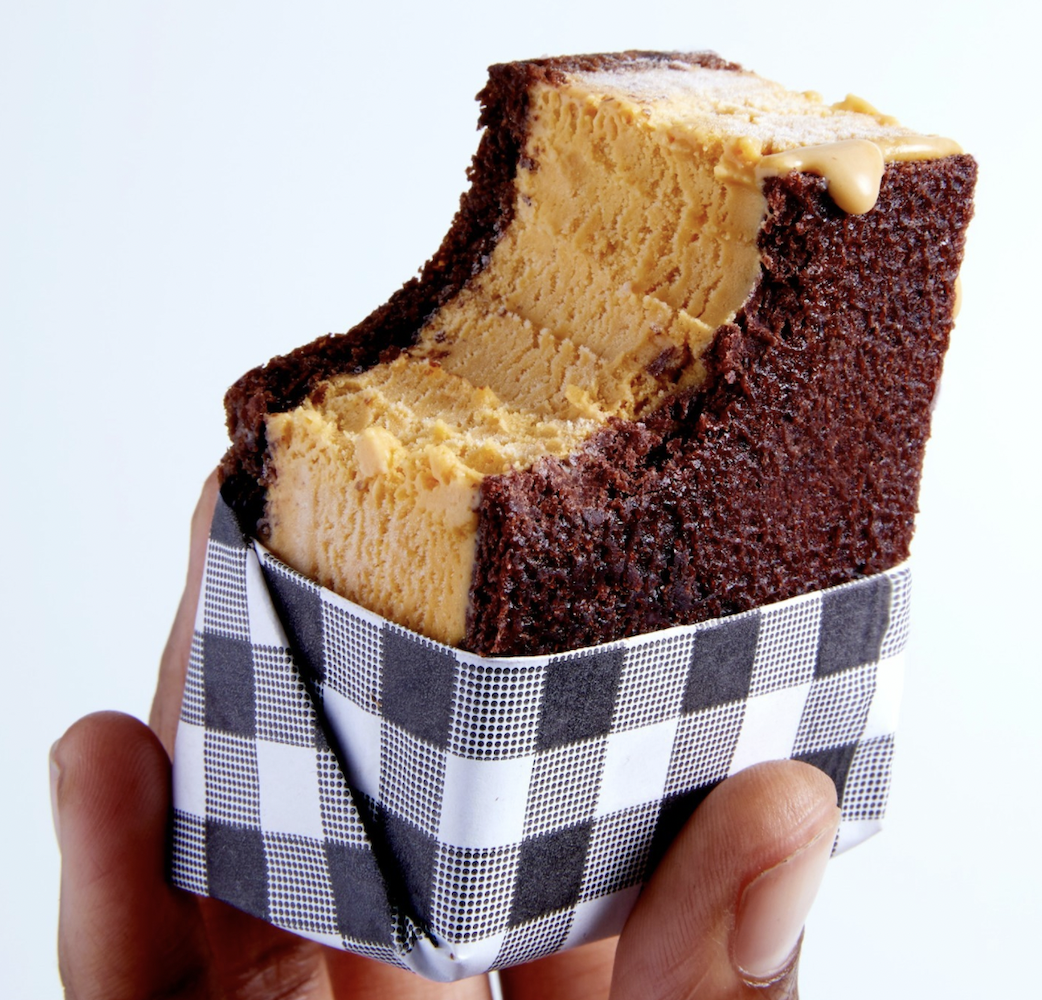
‘The Naughty One’ from Happy Endings (Credit: Instagram/Happy Endings)
Talking about being a woman in food, she adds: “Every woman who works the industry gets treated a bit different, even though guys would hate to hear that.
“What’s not really highlighted is the reality of being a queer women in the industry.
“One guy used to say to me, ‘Hey, so if I say this code, that means that you can see her boobs through her shirt’. It’s like, just because I’m a gay woman does not mean I’m a fucking voyeur”.
As enraging as these experiences have been, Terri is keen to highlight that they’re far from reflective of every individual she’s worked with.
“Throughout my career, I’ve been really clear about the kind of behaviour that I would tolerate as a chef,” she says. “And there’s been a couple of [these moments], but honestly, on the whole, everyone’s been amazing.
“The industry sadly hasn’t changed as much as I would like it to, and there are still chefs who swear, and are derogatory…but my advice is, surround yourself with people who support you and don’t bring you down.
“There are a load of talented, amazing women from all walks of life doing food. We just have to open our eyes a bit more”.
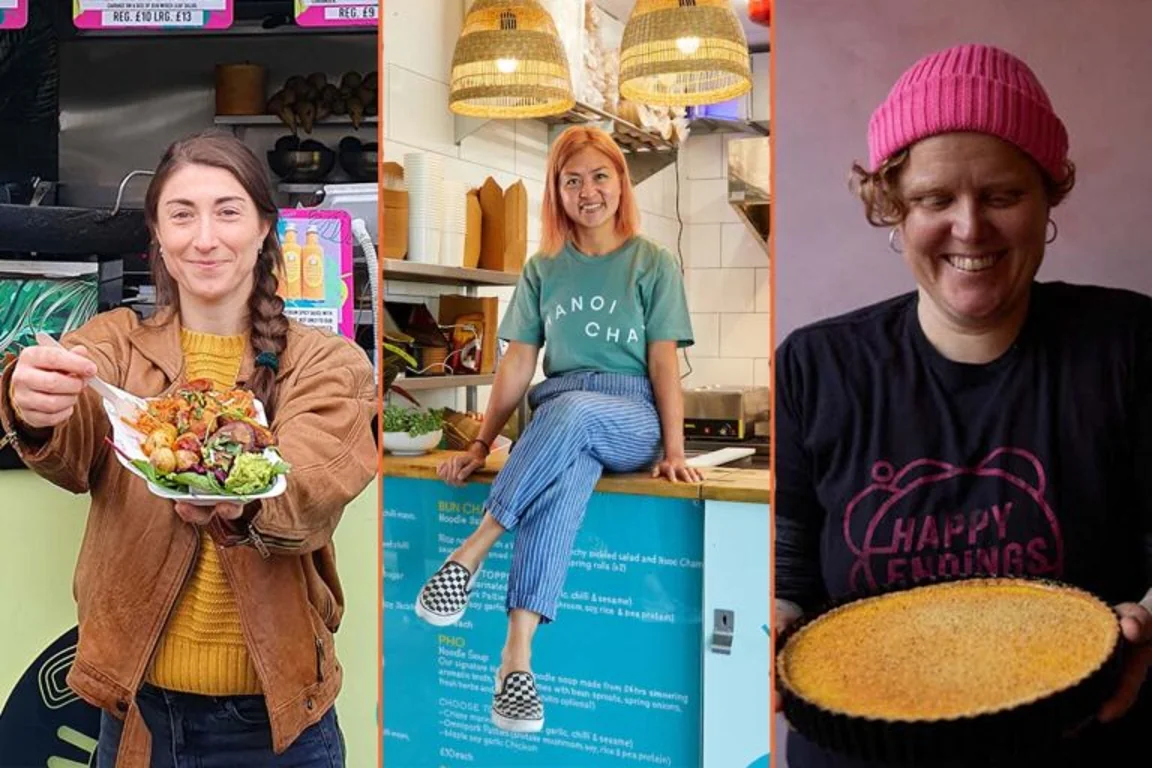


.jpg_dU0O4c?tr=w-2560,f-webp,q-70)